Text
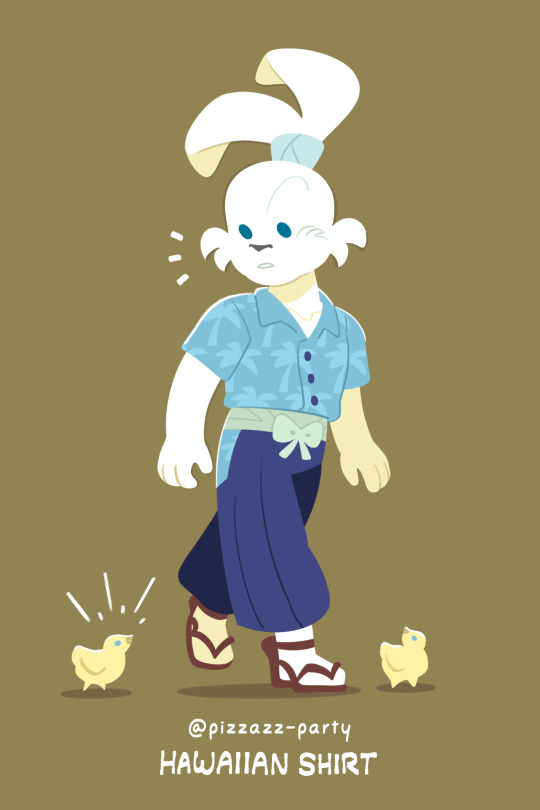
Day eighteen! Cheep cheep cheep.
#COOL. BREEZY. THRIVING.#no idea why the chicks are there but absolutely delighted the chicks are there.#usagi yojimbo
72 notes
·
View notes
Text
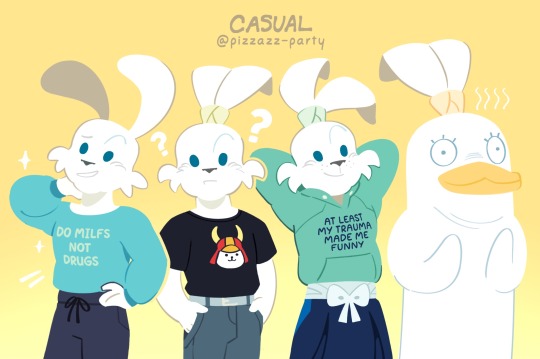
Day seventeen! The complete set at last.
Remember when I joked about sticking him in the weird Gintama duck suit hoodie if we didn’t get enough requests to fill the challenge? Someone requested it anyway. 🐥
#DUCK DUCK DUCK#love the little steaming anger lines#seeing them all together is so good#usagi yojimbo#arty art
102 notes
·
View notes
Text
literally so embarrassing to have someone go "i don't go here" or "what's this from?" on my art and it's a rarepair/crackship that is in no way representative of the source material... and i have to be like. well you see, the rest of the restaurant's menu is not like this. i'm doing my own thing eating black olives right out of the can in the back-of-house. whether or not you want me to throw you a can, you have to understand that's not what they serve out front
34K notes
·
View notes
Text
At some point in tumblr history, the tumblr cycle of hipster media consumption added a component of "mandatory moral value" to its justification for praising or hating anything, which has made it exhausting to come across countless displays of mental gymnastics to justify, morally and ethically, why liking or not liking whatever piece of media (or part of it) makes you essentially a good or a bad person.
The cycle was always there, but it went from this
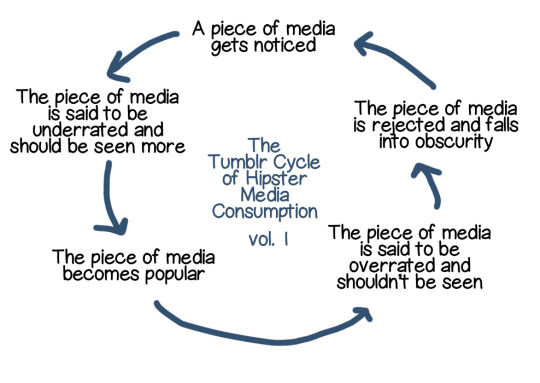
to this
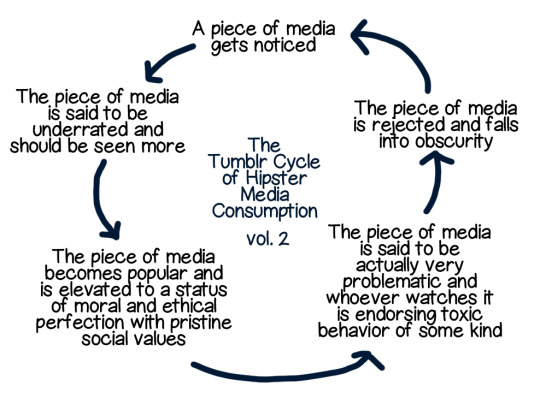
and sometimes I think we're past it and then I go to a tag and come across some manifesto that makes me feel like I'm in hell.
7K notes
·
View notes
Text

235 notes
·
View notes
Text
1. Yesterday I learned that in certain font software, the glyph names for guillemets («») incorrectly name them as “guillemotleft” and “guillemotright”. The guillemot is a type of sea bird.
2. Both guillemet and guillemot are diminutive forms of Guillaume (French equivalent of William). In the case of the punctuation marks, this is in honor of the 16th-c. printer Guillaume Le Bé, popularly credited with inventing them. Unclear why the sea birds are “little Williams”.
3. The misnamings in the font software are probably a simple typo. However! There are some other, less accidental connections between these punctuation marks and waterfowl. One of the German terms for guillemets is Möwchen (lit. “little seagulls”), and in English they can alternatively be called “duckfoot quotes”.
161 notes
·
View notes
Text
“in the comics” is such a great phrase you can lie about anything and no one will check. in the comics wonder woman has on panel passionate lesbian sex with cheetah
4K notes
·
View notes
Text
There should be a fanfic writing game called the showrunners challenge where someone writes a story and partway through someone else can play things like "actor leaves after 4000 more words" or "topic now too politically sensitive due to unforeseen world events" or "lost rights to that reference"
15K notes
·
View notes
Note
Inspired by your last ask! What are the best French books you’ve read that have no English translation yet? I read Play Boy and Qui a tué mon père (really loved the latter) last year and it feels so fun to read something that other Americans can’t access yet
I'm too nervous to make any list of the Best XYZ Books because I don't want to raise your expectations too high! But okay, here's my No English Translation-themed list of books I've enjoyed in recent years. I tried to make it eclectic in terms of genre as I don't know what you prefer :)
Biographies
• Le dernier inventeur, Héloïse Guay de Bellissen: I just love prehistory and unusual narrators so I enjoyed this one; it's about the kids who discovered the cave of Lascaux, and some of the narration is written from the perspective of the cave <3 I posted a little excerpt here (in English).
• Ces femmes du Grand Siècle, Juliette Benzoni: Just a fun collection of portraits of notable noblewomen during the reign of Louis XIV, I really liked it. For people who like the 17th century. I think it was Emil Cioran who said his favourite historical periods were the Stone Age and the 17th century but tragically the age of salons led to the Reign of Terror and Prehistory led to History.
• La Comtesse Greffulhe, Laure Hillerin: I've mentioned this one before, it's about the fascinating Belle Époque French socialite who was (among other things) the inspiration for Proust's Duchess of Guermantes. I initially picked it up because I will read anything that's even vaguely about Proust but it was also a nice aperçu of the Belle Époque which I didn't know much about.
• Nous les filles, Marie Rouanet: I've also recommended this one before but it's such a sweet little viennoiserie of a book. The author talks about her 1950s childhood in a town in the South of France in the most detailed, colourful, earnest way—she mentions everything, describes all the daft little games children invent like she wants ageless aliens to grasp the concept of human childhood, it's great.
I'll add Trésors d'enfance by Christian SIgnol and La Maison by Madeleine Chapsal which are slightly less great but also sweet short nostalgic books about childhood that I enjoyed.
Fantasy
• Mers mortes, Aurélie Wellenstein: I read this one last year and I found the characters a bit underwhelming / underexplored but I always enjoy SFF books that do interesting things with oceans (like Solaris with its sentient ocean-planet), so I liked the atmosphere here, with the characters trying to navigate a ghost ship in ghost seas...
• Janua Vera, Jean-Philippe Jaworski: Not much to say about it other than they're short stories set in a mediaeval fantasy world and no part of this description is usually my cup of tea, but I really enjoyed this read!
Essays / literary criticism / philosophy
• Eloge du temps perdu, Frank Lanot: I thought this was going to be about idleness, as the title suggests, and I love books about idleness. But it's actually a collection of short essays about (French) literature and some of them made me appreciate new things about authors and books I thought I knew by heart, so I enjoyed it
• Le Pont flottant des rêves, Corinne Atlan: Poetic musings about translation <3 that's all
• Sisyphe est une femme, Geneviève Brisac: Reflections about the works of female writers (Natalia Ginzburg, Virginia Woolf, Sylvia Townsend Warner, etc) that systematically made me want to go read the author in question, even when I'd already read & disliked said author. That's how you know it's good literary criticism
Let's add L'Esprit de solitude by Jacqueline Kelen which as the title suggests, ponders the notion of solitude, and Le Roman du monde by Henri Peña-Ruiz which was so lovely to read in terms of literary style I don't even care what it was about (it's philosophy of foundational myths & stories) (probably difficult to read if you're not fully fluent in French though)
Did not fit in the above categories:
• Entre deux mondes by Olivier Norek—it's been translated in half a dozen languages, I was surprised to find no English translation! It's a crime novel and a pretty bleak read on account of the setting (the Calais migrant camp) but I'd recommend it
• Saga, Tonino Benacquista: Also seems to have been translated in a whole bunch of languages but not English? :( I read it ages ago but I remember it as a really fun read. It's a group of loser screenwriters who get hired to write a TV series, their budget is 15 francs and a stale croissant and it's going to air at 4am so they can do whatever they want seeing as no one will watch it. So they start writing this intentionally ridiculous unhinged show, and of course it acquires Devoted Fans
Books that I didn't think existed in English translation but they do! but you can still read them in French if you want
• Scrabble: A Chadian Childhood, Michaël Ferrier: What it says on the tin! It's a short and well-written account of the author's childhood in Chad just before the civil war. I read it a few days ago and it was a good read, but then again I just love bittersweet stories of childhood
• On the Line, Joseph Ponthus: A short diary-like account of the author's assembly line work in a fish factory. I liked the contrast between the robotic aspect of the job and the poetic nature of the text; how the author used free verse / repetition / scansion to give a very immediate sense of the monotony and rhythm of his work (I don't know if it's good in English)
• The End of Eddy, Edouard Louis: The memoir of a gay man growing up in a poor industrial town in Northern France—pretty brutal but really good
• And There Was Light, Jacques Lusseyran: Yet another memoir sorry, I love people's lives! Jacques Lusseyran lost his sight as a child, and was in the Resistance during WWII despite being blind. It's a great story, both for the historical aspects and for the descriptions of how the author experiences his blindness
• The Adversary: A True Story of Monstrous Deception, Emmanuel Carrère: an account of the Jean-Claude Romand case—a French man who murdered his whole family to avoid being discovered as a fraud, after spending his entire adult life pretending to be a doctor working at the WHO and fooling everyone he knew. Just morbidly fascinating, if you like true crime stuff
#sroloc's tumblr archive#reference#je cherche toujours pour les ouvrages à pratiquer et tous ces livres semblent interessant merci!
199 notes
·
View notes
Quote
Once, when I was describing to a friend from Syracuse, New York, a place on the plains that I love, a ridge above a glacial moraine with a view of almost fifty miles, she asked, “But what is there to see?” The answer, of course, is nothing. Land, sky, and the ever-changing light.
Kathleen Norris, Dakota: A Spiritual Geography (via exhaled-spirals)
744 notes
·
View notes
Text
We sometimes treat avoiding Annoying Queer People as if it’s essential to the LGBTQ community’s self-preservation. We agonize over event descriptions and identity-based admittance policies, wondering how to discourage all the Annoying (and often, it’s implied, fake) Queers from attending without restricting any actual queers. (This always fails, because it turns out that actual queer people are humans, and therefore pretty annoying. And being annoying, by the way, is not a crime.)
In order to fortify ourselves against Annoying Queers, we mock all their signifiers and regard them as massive social red flags: straight husbands, bolo ties, sexual inexperience, ukuleles, rainbow pins from Target, misconceptions about what hormones do, and Picrew avatars all somehow get treated with equal venom, no matter where they are coming from and why.
The problem is, none of these traits tell us anything about how safe a person actually is to be around. Only observing their patterns of behavior can do that. By demonizing “cringey” and irritating attributes as the signs of a deep character flaw, we ignore the fact they tend to cluster among the closeted, questioning, or newly-out for a reason.
When a socially isolated queer person in the suburbs feels that nobody sees them as they are, they might cover themselves in rainbow swag from the local big-box store to an ‘annoying’ degree. When a closeted lesbian teen hasn’t had the chance to form genuine relationships with LGBTQ people, all her reference points might come from shows like Our Flag Means Death and Heartstopper which yeah, might seem fangirlish and irritating to a more seasoned adult. When a profoundly repressed trans divorcee still believes the misinformation about hormones they’ve been fed by the press, they might repeat some downright offensive myths about pelvic floor damage or body hair being disgusting. This too, is incredibly exhausting to help someone process again and again.
I don’t think any of us literally believe that the more irritating a person is, the more of a pressing political threat they are. But we behave as if we do. We devote huge amounts of time to complaining about the types of queer people that irritate us, and develop complex taxonomies for describing why they are so annoying and why defeating that annoyingness matters. This person is a tenderqueer, that one is a tucute, and in their style of dress and annoying mannerisms we can tell that they represent all that we hate most about ourselves and how we are seen.
It’s easy for us to wind up directing more attention toward the queer people that annoy us than we do to our shared enemies.
It’s not a good use of our time. It’s not good for our shared futures. And it’s all rooted in internalized shame.
I wrote about biphobia, acephobia, transphobia, and the troubling respectability politics of hating the "Annoying Queer Person." The full essay is free to read (or have narrated to you!) on my Substack.
490 notes
·
View notes
Text
❗dailyquests Follow
Find Out why that Little Latin Boy in Drag is Crying.
1K notes
·
View notes
Text
it’s been four years since I last watched through all of Hannibal & I still think about the episode set in West Virginia where they’re literally at the beach. The beach in Grafton WV. A town notably 1,000 feet above sea level & roughly 200 miles from the nearest seawater
Like….was it supposed to be a lake….
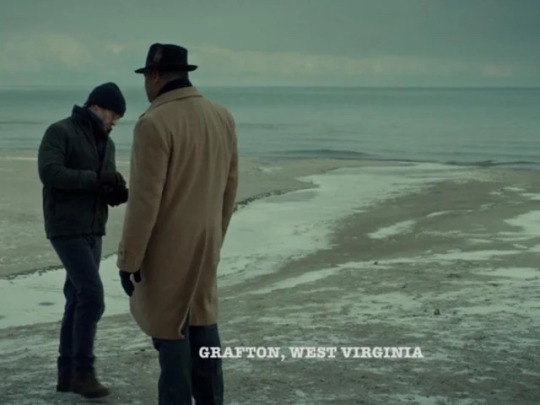
is this perhaps what someone at NBC thinks a lake in the Appalachian mountains looks like
4K notes
·
View notes
Text
i made a character uquiz. i 100% promise you that you will get a character you know AND like
31K notes
·
View notes
Text
14K notes
·
View notes

